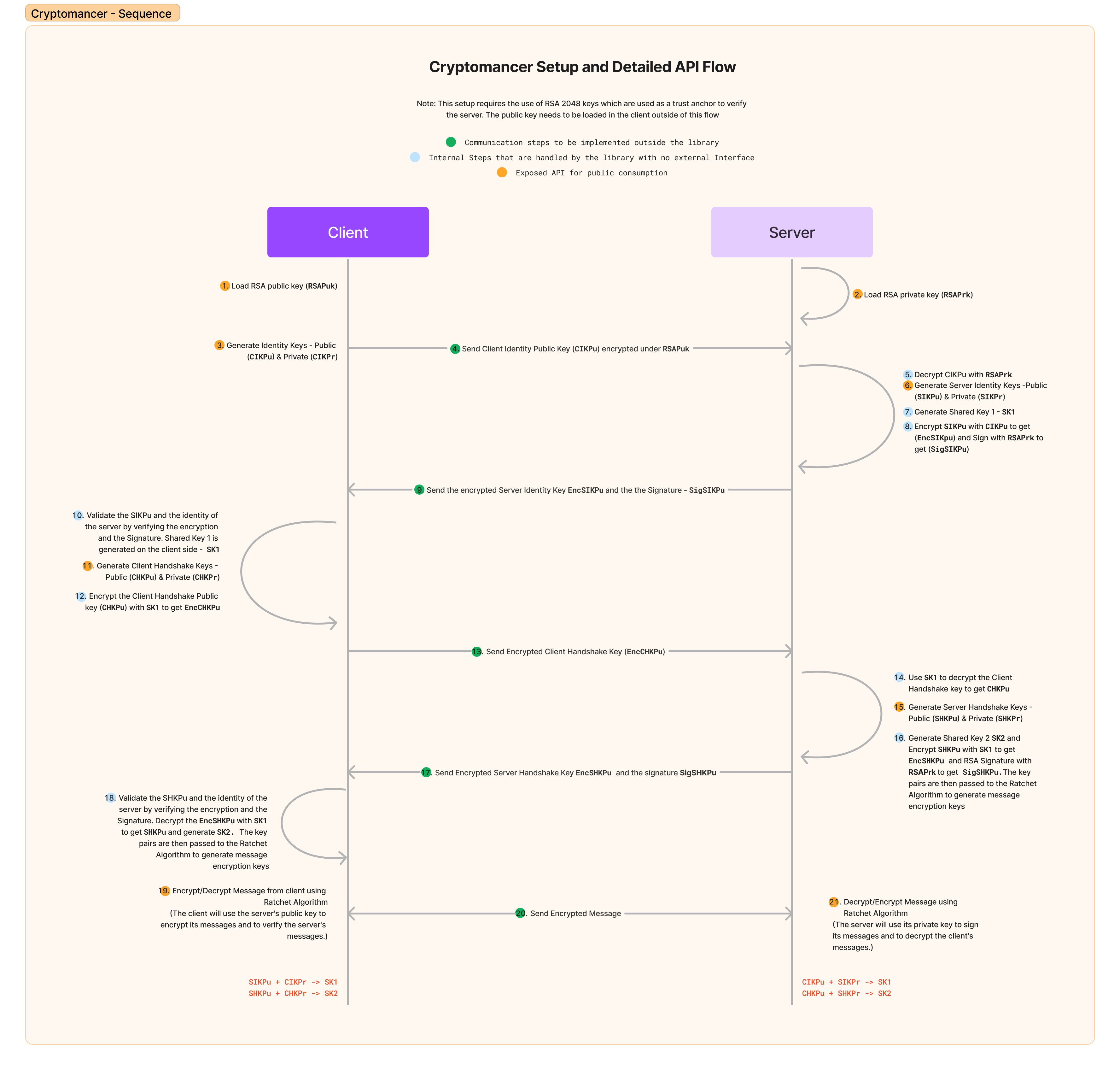@jetit/cryptomancer
v2.2.6
Published
`@jetit/cryptomancer` is a library that provides an implementation of forward secrecy encryption for secure communication between clients and servers built on top of [TweetNacl](https://github.com/dchest/tweetnacl-js) using the [Double Ratchet Algorithm](
Downloads
3,967
Readme
@jetit/cryptomancer
@jetit/cryptomancer is a library that provides an implementation of forward secrecy encryption for secure communication between clients and servers built on top of TweetNacl using the Double Ratchet Algorithm.
Installation
To install Cryptomancer, you can use npm or yarn:
npm install @jetit/cryptomanceror
yarn add @jetit/cryptomancerUsage
The library exposes all the code required to achieve secure communication using forward secrecy in a client-server environment. You can also build peer-peer networks by implementing both client/server in each node. The library also offers server signature verification using RSA2048 PKCS1-v1_5 to enable server validation. The below steps show implementation details on the client and the server.
The below diagram shows the setup and message exchange between client and server

Server
To initialize Cryptomancer as the server, you can use the server method provided by the library. Here's an example of how to use it:
import { Server } from '@jetit/cryptomancer';
const server: Server.CryptomancerServer = Server.cryptomancer();
// Step 1: Configure the RSA private key for signature
server.setRsaPrivateKey('RSA_PRIVATE_KEY');
// Step 4: Set the peer's identity public key
server.setPeerIdentityKey('PEER_IDENTITY_PUBLIC_KEY');
// Step 5: Get the identity public key
const identityDetails = await server.getIdentityPublicKey();
// Send the identityDetails, signature to client
// Step 8: Set the peer's handshake public key
server.setPeerHandshakePublicKey('PEER_HANDSHAKE_PUBLIC_KEY');
// Step 9: Get the handshake public key
const handshakeDetails = await server.getHandshakePublicKey();
// Send the handshakeDetails, signature to client
// Step 12: Decrypt a received message
const decryptedMessage = await server.decrypt(encryptedMessage);
console.log(decryptedMessage);
// Step 14: Encrypt and send a message
const message = 'Hello, client!';
const encryptedMessage = await server.encrypt(message);
// Send the encrypted message to the client
Client
To initialize cryptomancer as the client, you can use the client method.
import { Client } from '@jetit/cryptomancer';
const client: Client.CryptomancerClient = Client.cryptomancer();
// Step 2: Get the RSA public Key from server, Configure the RSA public key for verification
client.setRsaPublicKey('RSA_PUBLIC_KEY');
// Step 3: Get the identity public key
const identityPublicKey = await client.getIdentityPublicKey();
// Send the identityPublicKey to server
// Step 6: Set the peer's identity public key
client.setPeerIdentityKey('PEER_IDENTITY_DETAILS');
// Step 7: Get the handshake public key
const handshakePublicKey = await client.getHandshakePublicKey();
// Send the handshakePublicKey to server
// Step 10: Set the peer's handshake public key
client.setPeerHandshakePublicKey('PEER_HANDSHAKE_DETAILS');
// Step 11: Encrypt and send a message
const message = 'Hello, server!';
const encryptedMessage = await client.encrypt(message);
// Send the encrypted message to the server
// Step 13: Decrypt a received message
const decryptedMessage = await client.decrypt(serverEncryptedMessage);
console.log(decryptedMessage);Server Session Serialization Support
import { fs } from 'fs';
// Step 1: Serialize the session
const serializedServerSession = server.serialize();
// Step 2: Save session for usage later
fs.saveFileSync('server_session.txt', serializedServerSession);
// Step 3: Get saved session details
const existingSession = fs.readFileSync('server_session.txt')
// Step 4: Resume previous session
const deserializedServerSession: Server.CryptomancerServer = Server.cryptomance();
deserializedServerSession.resume(existingSession);
deserializedServerSession.setRsaPrivateKey('RSA_PRIVATE_KEY');
const message1 = 'Hello, client!';
const encryptedMessage1 = await deserializedServerSession.encrypt(message1);
API Reference
Client Methods
setRsaPublicKey(key: string): void: Configures the RSA public key for verification. This step is optional.getIdentityPublicKey(): Promise<string>: Retrieves the client's identity public key.setPeerIdentityKey(peerIdentity:string): Promise<void>: Sets the peer's identity public key. The peer's RSA signature is also required.getHandshakePublicKey(): Promise<string>: Retrieves the client's handshake public key.setPeerHandshakePublicKey(peerHandshake: string,): Promise<void>: Sets the peer's handshake public key.encrypt(message: string): Promise<IFSMessage>: Encrypts a message using the Ratchet algorithm.decrypt(message: string): Promise<DecryptedMessage>: Decrypts a received message using the Ratchet algorithm.
Server Methods
setRsaPrivateKey(key: string): void: Configures the RSA private key for signature. This step is optional.getIdentityPublicKey(): Promise<string>: Retrieves the server's identity public key and signature. The signature is generated using the RSA private key.setPeerIdentityKey(identityPublicKey: string): Promise<void>: Sets the peer's identity public key.getHandshakePublicKey(): Promise<string>: Retrieves the server's handshake public key.setPeerHandshakePublicKey(handshakePublicKey: string): Promise<void>: Sets the peer's handshake public key.encrypt(message: string): Promise<string>: Encrypts a message using the Ratchet algorithm.decrypt(message: string): Promise<DecryptedMessage>: Decrypts a received message using the Ratchet algorithm.serialize(): string: Serializes the current ratchet session into an encoded string. This allows for storing or transferring the session state.resume(session: string): void: Resumes a ratchet session using a serialized session string. The session string should be previously generated using theserialize()method. This allows for restoring a previous session state.
